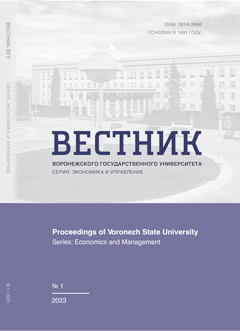Ведомственный контроль финансового-хозяйственной деяльности государственных учреждений: практический опыт в сфере государственного здравоохранения и пути развития
Аннотация
Предмет. Организационные и методические аспекты ведомственного контроля финансового-хозяйственной деятельности и других видов ведомственного контроля, осуществляемых исполнительными органами власти в отношении подведомственных учреждений.
Цель. В исследовании поставлена цель определить место ведомственного контроля финансово-хозяйственной деятельности в системе финансового контроля Российской Федерации, изучить действующие организационные модели отдельных видов ведомственного контроля на примере системы государственного здравоохранения Воронежской области, определить проблемные вопросы и предложить возможные варианты их решения.
Метод. В процессе исследования использовались данные консолидированного бюджета РФ и бюджетов государственных внебюджетных фондов РФ за 2020 г., консолидированного бюджета государственных медицинских организаций Воронежской области и другие финансовые показатели системы здравоохранения Воронежской области за аналогичный период. Применялись методы анализа, наблюдения, обобщения, сравнения, группировки, классификации и др.
Результаты. Разработана организационная структура контроля (надзора) в сфере охраны здоровья и финансового контроля сферы государственного здравоохранения, исследованы полномочия и функции исполнительных органов власти. Анализ основных разделов контрольных видов выявил взаимосвязь внешнего и внутреннего контроля как элементов единой системы контроля. Приведены примеры типичных нарушений, выявленных по результатам ведомственного государственных медицинских организаций Воронежской области.
Выводы. Подтверждена гипотеза о необхомости осуществления ведомственного контроля финансового-хозяйственной деятельности, как части системы государственного (муниципального) управления, посредством инструментария финансового контроля и учетом отраслевой специфики.
Литература
Belobzhetskiy, I. A. (1989) [Financial control and a new economic mechanism.] Moscow: Finances and Statictics.
Golovin, S. V. (2021) Statutory regulation of financial control of public institutions: current issues and ways of development. International Accounting. 6(480), 653-666. (In Russian)
Golovin, S. V. (2019) Certain aspects in state assignment execution control (on the example of public health institutions). Modern Economics:Problems and Solutions. 10(118), 104-114. (In Russian)
Golovin, S. V., Lutsenko, M. S. & Shendrikova, O. O. (2020) On the issue of control over the procurement of goods, works and services of organizations of the commercial and public sector of the economy. Proceedings of Voronezh State University. Series: Economics and Management. 4, 15–29. (In Russian). DOI: 10.17308/econ.2020.4/3189
Danilenko, N. I. (2015) Departmental (internal) financial control and audit: an effective management tool. Accounting in budgetary and non-profit organizations. 18(378), 17-21. (In Russian)
Zhuklinets, I. I. (2017) Control of activities and departmental control by the founder in state educational organizations. Academic Bulletin of SPBAPPO. 4(38), 23-38. (In Russian)
Metelnikov, E. O. & Kokarev, A. I. (2020) [WFA by new rules]. Accounting.4 (184), 34-38. (In Russian)
Murashko, M. A. & Seregina, I. F. (2019) Organization of the control system for realization of the national project "health care" by Roszdravnadzor. Vestnik of «Roszfravnadzor». 4, 5–12. (In Russian)
Nikolaev, A. S. (2020) Departmental control in budgetary and municipal institutions. Topical issues of improving state (municipal) financial control, internal financial control and internal financial audit. Procedings of the All-Russian Scientific and Practical Conference, Ekaterinburg, 26 November. Ekaterinburg, USUE, pp. 110–114.
Pozhidaeva, T. A. (2012) [Comparative characteristics of the external (financial) and internal economic control of the organization's activities]. International Accounting. 15(213), 40-49. (In Russian)
Chagin, K. G. (2017) [Control over the activities of budgetary institutions]. Head of a budgetary organization. 6, 45–53. (In Russian)
Amran, A., Lee, S. P. & Devi S. S. (2014) The influence of governance structure and strategic corporate social responsibility toward sustainability reporting quality. Business Strategy and the Environment. 4(23), 217–235.
Endovitsky, D. A., Endovitskaya, E. V., Golovin, S. V. & Churikov, A. V. (2021) Monitoring the Implementation of the National Healthcare Project. The Challenge of Sustainability in Agricultural Systems. 1, 871-878.
Jarrett, P. [и др.]. (2021) Healthcare governance during humanitarian responses: a survey of current practice among international humanitarian actors. Conflict and Health. 1(15).
Kudinov, D. A. [и др.]. (2021) Overview of Promising Information Technologies in the Healthcare System from the Position of a System Approach. Studies in Systems, Decision and Control. (283), 225–235.
Sarkar, A., Maitra, T. & Neogy, S. (2021) Blockchain in healthcare system: Security issues, attacks and challenges. Intelligent Systems Reference Library. (203), 113–133.
Susanto A. Meiryani (2018) The quality of accounting information system and its impact on the quality of accounting information: User ability and top management support. Journal of Engineering and Applied Sciences. 2(13), 384–387.
Uyar, A. (et al.) (2021) Board structure, financial performance, corporate social responsibility performance, CSR committee, and CEO duality: Disentangling the connection in healthcare. Corporate Social Responsibility and Environmental Management.
Copyright (c) 2021 Головин С.В.

Это произведение доступно по лицензии Creative Commons «Attribution» («Атрибуция») 4.0 Всемирная.























